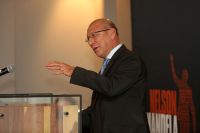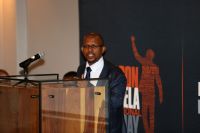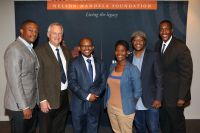Nelson Mandela’s service to South Africa was “continuous and infectious”, even when he was not physically able to serve any more, former Finance Minister Trevor Manuel said today.

Trevor Manuel
Speaking at the launch of Nelson Mandela International Day 2015 activities at the Nelson Mandela Foundation’s offices in Johannesburg, Manuel said the building of democracy and uplifting of communities was an inclusive process.
“We can only be free when we understand that our freedom is bound by the freedom of others,” he said. He added that the global financial crisis of 2008 had been caused by “infectious greed”, and could only be solved by “infectious caring”.
In opening the event, Nelson Mandela Foundation CEO Sello Hatang highlighted Mr Mandela’s three rules: free yourself, free others, and serve every day.
He had touched on service in his first address following his release on 11 February 1990, when he said to South Africans: “I therefore place the remaining years of my life in your hands.”
Hatang recited another quotation by Mr Mandela: “The very right to be human is denied every day to hundreds of millions of people as a result of poverty, the unavailability of basic necessities such as food, jobs, water and shelter, education, health care and a healthy environment.”
In his address, Manuel said the National Planning Commission that he headed had embraced a capabilities approach – that people participate in society because they feel themselves to be capable. If they feel undermined in society, “then we don’t participate as equals”.
He said that Nelson Mandela International Day carried four important messages:
- The profile of what is being done will be raised by good preparation
- The campaign is not about “parachuting” into activities – it is about building relationships
- The campaign is not about money, but rather the ability to mobilise people to do things together
- It is not about doing something and standing back – it is about continuity of action
“Part of the messaging needs to be inclusiveness ... Everybody needs to have equal worth,” he said, verbalising a concept that underpins several Nelson Mandela International Day partners’ initiatives.
Nelson Mandela International Day is not an act of charity; it is a process of driving change, Manuel concluded.
Hatang then enumerated the four pillars of Nelson Mandela International Day:
- Education and literacy – to give the youth “a fighting chance”
- Food security – many children go to school simply for the meal they receive there
- Shelter – a necessary intervention
- Volunteerism – because sometimes it is more about giving time, than money
Various Nelson Mandela International Day partners spelled out their efforts to date, and what they plan for the 2015 campaign.

Sello Hatang
Bobby Moroe, of the Department of International Relations and Co-operation, said that campaign activities happen in all of South Africa’s 126 foreign missions and with all 142 foreign missions to this country, to “translate the values of ubuntu, humility and caring for others”.
Tim Smith, of Breadline Africa, explained the Mandela Day Library initiative, which has so far seen 53 shipping container libraries being erected at needy schools around the country to improve literacy and “unlock [children’s] minds and imagination”.
“We believe in children. We believe children can be phenomenal,” Smith said.
A video by Habitat for Humanity, whose volunteers build homes all over the world, focused on a project at Pelican Park in Cape Town, where residents were involved in the project and given training in order for them to make informed decisions about their community.
Tshepo Ramodibe, of Vodacom, pledged that the cellular network provider would continue its education, food security and volunteering efforts in support of Nelson Mandela International Day, and he spoke of how Vodacom encouraged its staff to participate through payroll giving and involvement in volunteering.
“We are only as sustainable as the communities we live in,” he said.
Kaya FM’s Mark Mdlela described how the radio station’s 67km for Mandela Relay had grown exponentially since its inception in 2013, raising R2.1-million so far, and how Kaya FM was now considering franchising the event around the world.
Dr Nosipho Mngomezulu, of Rhodes University, explained how the university had created its Trading Live programme to have an asset-based approach, as opposed to a deficit-based one. It had done away with a benefactor-beneficiary paradigm, in the belief that everyone was in the same community, and all needed to be active within it.

Partnering with the Nelson Mandela Foundation, from left: Luvuyo Mandela (Mr Mandela's great-grandson), Tim Smith (Breadline SA), Sello Hatang (Nelson Mandela Foundation CEO), Dr Nosipho Mngomezulu (Rhodes University), Mark Mdlela (Kaya FM) and Tshepo Ramodibe (Vodacom)
Trading Lives involved everyone listing what they could offer, and what they needed. A matchmaking process then fulfilled these offers and wishes, in the process shifting consciousness and transforming everyone.
“Our fates are inextricably connected to one another,” Mngomezulu said.
Luvuyo Mandela, Mr Mandela’s great-grandson, was impressed that many of the supporters were planning to expand their efforts, and were embracing inclusivity in their initiatives.
“It feels good that something you did changed someone’s life ... and also changed your life,” said Mandela, who added: “This is yet another thing we’re exporting to the world: working together to make a difference.”
View the strategic stakeholder session below: